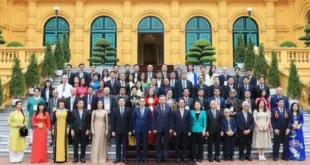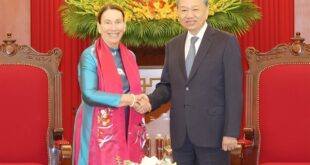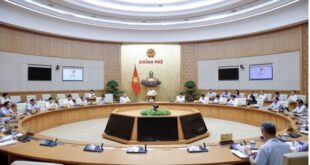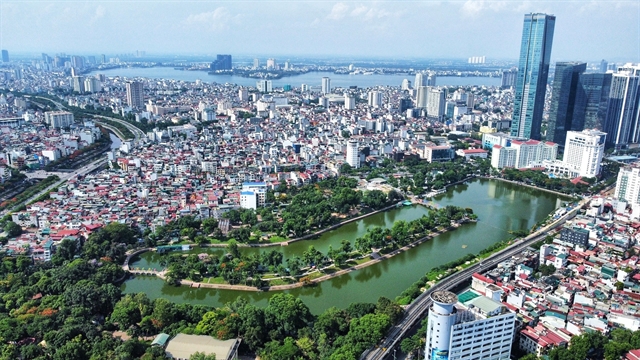 |
| A corner of Ba Đình District in downtown Hà Nội. — VNA/VNS Photo Huy Hùng |
The National Assembly last week adopted the amended Capital Law, which features a range of new policies that are meant to empower the city to unlock its full potential, free from ‘institutional bottlenecks’.
The revised law, emphasising further decentralisation and delegation of authority to the municipal authorities, consists of 54 articles arranged into seven chapters – an increase of three chapters and 27 articles compared to the original law first passed more than a decade ago in 2012.
The law will take effect from January 1, 2025, with some regulations a bit later in July.
Regarding the organisation of the Hà Nội administration, the law ensures a “streamlined, professional, modern, and effective administration”. Specifically, it stipulates that local administration of the city, districts, towns, and townships consist of the People’s Council [Assembly] and the People’s Committee [Administration], while the local administration at ward level will just be its People’s Committee, meaning that there shall not be People’s Council at the ward level, as part of the pilot urban government model in the city.
The new law grants over 80 additional tasks and responsibilities to the municipal People’s Council, and the city can have more full-time council representatives to undertake the demands of the new era.
Another authority delegation mechanism is that the law allows the Standing Board of the municipal People’s Council to decide on certain matters and report to the plenary session later, when the council is not in session, ensuring timely management of the capital city’s urgent affairs.
The law mandates focusing resources and prioritising the implementation of the Hồng (Red) River and Đuống River sub-area plans in line with the Capital City Master Plan and the General Planning for the Capital City. Hà Nội is permitted to develop a cultural industry centre along the Red River’s banks and other areas with cultural space advantages as per the plan.
Regarding the Hòa Lạc Hi-Tech Park, besides the highest preferential policies and investment support that existing regulations allow, the law prioritises investment in infrastructure for scientific and technological development in the park. It also includes compensation, support, resettlement, and housing arrangements for workers employed at the park.
The amended Capital Law permits investment in urban railway development in Hà Nội, prioritising the TOD (Transit-Oriented Development) model to ensure modernity, compatibility and sustainability. Within the TOD area, the city is allowed to collect and use 100 per cent of certain revenues for reinvestment in urban railways, public transportation systems, and technical infrastructure connected to the public transportation network.
With regards to fiscal and economic policies, the law says that the State prioritises investment and mobilisation of resources to leverage the capital’s potential and strengths for development, management and protection. If the central government’s revenue increases beyond the forecast share with Hà Nội’s budget, 30 per cent of the additional revenue will be allocated to the city’s budget.
Hà Nội will also receive 100 per cent of the additional revenue from policy adjustments on fees and charges for investment in socioeconomic infrastructure and expenditure on economic activities, science and technology, education, health care, culture, sports, and social welfare within the city’s budget.
The capital city is permitted to pilot the establishment of a venture capital fund using State budget resources to invest in high-tech enterprises, science and technology enterprises, and innovative startups in key scientific and technological fields to support and promote innovation and commercialisation of scientific and technological products.
In terms of social order and safety, the city can impose fines higher than but not exceeding twice the general maximum fine set by the central government for certain administrative violations in specific areas.
The chairperson of the People’s Committee at each level is authorised to require the cessation of electricity and water supply to certain buildings and business establishments, and in necessary cases, to uphold safety and security.
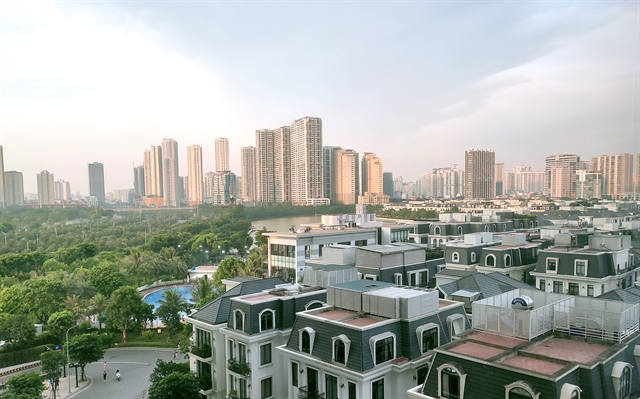 |
| A new urban area in Hà Nội. — VNS Photo Đoàn Tùng |
Highly anticipated
Deputy Trần Hoàng Ngân of HCM City’s NA delegation said he had been eagerly waiting for the passage of the new improved Capital Law, which inherited the essence of the previous law, while also updating, supplementing, and strengthening the decentralisation and delegation of authority to the leadership and people of the capital city.
“This [the Capital Law] provides the conditions to promote the development of Việt Nam’s capital to stand alongside those of the world’s great powers,” Ngân said.
“Hà Nội, the capital of Việt Nam, with its thousand-year history, thanks to the amended Capital Law, will be able to preserve the nation’s cultural identity, its beauty, and spirit while also expanding its development space. It will also facilitate the capital’s efforts to decentralise and delegate authority to develop the surrounding capital region. From the central area, an additional 4-5 urban areas will be developed in all four directions.”
Another point of focus will be the development of the space and scenery along the banks of the Red River, which helps reduce the congestion in the inner city, while still making for beautiful landscapes of water bodies, natural gardens, and historical sites that both local residents and tourists can enjoy.
The new law’s decentralisation items will also help this political centre of the country, which frequently welcomes international political leaders and visitors, maintain its security and safety.
Bùi Hoài Sơn, an associate professor in culture and management of historical sites and arts, and a lawmaker from the Hà Nội NA delegation, lauded the numerous items that can help advance the city’s culture – and via this, the entire country’s – not just in the Article 21 that specifically addresses cultural matters, but also other provisions that touch on creative spaces and cultural industry zones.
“We are resolving investment issues in public-private partnerships, within the Law on Management and Use of Public Assets. This creates better conditions for the cultural sector to make new strides. I appreciate the provisions that promote the development of the capital’s cultural industries,” Sơn said.
“The capital is very focused on developing cultural industries. We have the Hà Nội City Party Committee’s Resolution 09 on developing cultural industries, and to turn this attention into reality, the provisions related to the development of the capital’s cultural industries will help better implement the orientations and guidelines.”
The culture expert said right within July, the work and plans related to cultural development and cultural industry development are expected to start, which he believes will be a “wonderful condition and favourable environment for investors to confidently invest in cultural development projects”.
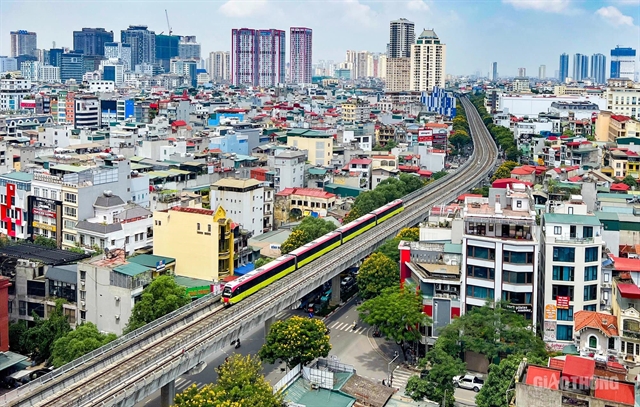 |
| The Nhổn – Hà Nội Station urban railway project (Hà Nội’s Metro No 2) during a trial run. Photo from the Hà Nội Metropolitan Railway Management Board |
Work to do
Phạm Thị Thanh Mai, deputy head of Hà Nội’s NA delegation, expressed the ‘unforgettable feeling’ of the entire delegation when the bill was adopted, but also the cautious concerns over the tremendous workload and responsibilities to soon bring the revamped law to life.
Building the legal frameworks and guiding documents at the highest possible level of quality, the development of a professional and capable cadre system to serve the city’s development, as well as the publicity of the new items in the revised Capital Law to all people of the city will be priorities.
Speaking at this week’s meeting of the city’s People’s Council, NA Vice Chairwoman Nguyễn Thị Thanh said the recent 7th session of the NA has completed a large load of work, including three items directly concerning Hà Nội – the ‘historically significant’ passing of the new Capital Law, and the discussions on Capital Master Plan for 2021-30, and the Revised General Planning of Hà Nội Capital City towards 2045.
“The many breakthrough regulations in the law are meant to develop Hà Nội in a way that is worthy of a special urban area, helping to create a ‘cultured – civilised – modern’ capital city,” Thanh said.
She emphasised that with the more autonomy granted to Hà Nội, the onus was now heavier on the city’s authorities in implementing tasks to build, protect, and develop the capital.
She urged the Hà Nội authorities to “seize this opportunity, take decisive action, and mobilise synergistic strengths to maximise the effectiveness of the specific mechanisms” – including outlining a roadmap and assigning responsibilities to relevant agencies, so that the amended Capital Law can start bringing practical results as soon as it comes into effect. VNS
- Reduce Hair Loss with PURA D’OR Gold Label Shampoo
- Castor Oil Has Made a “Huge” Difference With Hair and Brow Growth
- Excessive hair loss in men: Signs of illness that cannot be subjective
- Dịch Vụ SEO Website ở Los Angeles, CA: đưa trang web doanh nghiệp bạn lên top Google
- Nails Salon Sierra Madre
 VnExpress News The News Gateway of Vietnam
VnExpress News The News Gateway of Vietnam
